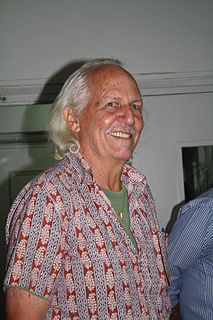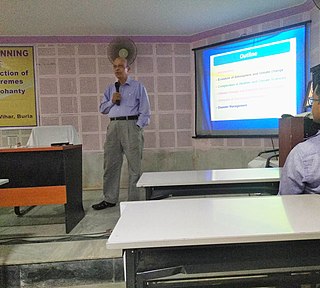Related Research Articles

Mankombu Sambasivan Swaminathan is an Indian geneticist and administrator, known for his role in India's Green Revolution, a program under which high-yield varieties of wheat and rice were planted. Swaminathan has been called the "Father of Green Revolution in India" for his role in introducing and further developing high-yielding varieties of wheat in India. He is the founder of the MS Swaminathan Research Foundation. His stated vision is to rid the world of hunger and poverty. Swaminathan is an advocate of moving India to sustainable development, especially using environmentally sustainable agriculture, sustainable food security and the preservation of biodiversity, which he calls an "evergreen revolution."

Romulus Earl Whitaker is an Indian herpetologist, wildlife conservationist, and founder of the Madras Snake Park, the Andaman and Nicobar Environment Trust (ANET), and the Madras Crocodile Bank Trust. In 2008, Whitaker was selected as an associate laureate in the 2008 Rolex Awards for Enterprise for his efforts to create a network of rainforest research stations throughout India. In 2005, he was a winner of a Whitley Award for outstanding leadership in nature conservation. He used this award to found the Agumbe Rainforest Research Station in Karnataka, for the study of king cobras and their habitat.

K. Ullas Karanth is a conservation zoologist and a leading tiger expert based in Karnataka, India. He was the director of the Wildlife Conservation Society's India Programme. He is notable for pioneering the scientific use of camera traps in population density studies of large wild mammals in India. He was a Senior Conservation Scientist with the New York based Wildlife Conservation Society (WCS) and Technical Director of the WCS Tiger Conservation Program.

Madhav Dhananjaya Gadgil is an Indian ecologist, academic, writer, columnist and the founder of the Centre for Ecological Sciences, a research forum under the aegis of the Indian Institute of Science. He is a former member of the Scientific Advisory Council to the Prime Minister of India and the Head of the Western Ghats Ecology Expert Panel (WGEEP) of 2010, popularly known as the Gadgil Commission. He is a recipient of the Volvo Environment Prize and the Tyler Prize for Environmental Achievement. The Government of India awarded him the fourth highest civilian award of the Padma Shri in 1981 and followed it up with the third highest award of the Padma Bhushan in 2006.

George Beals Schaller is a German-born American mammalogist, biologist, conservationist and author. Schaller is recognized by many as the world's preeminent field biologist, studying wildlife throughout Africa, Asia and South America. Born in Berlin, Schaller grew up in Germany, but moved to Missouri as a teen. He is vice president of Panthera Corporation and serves as chairman of their Cat Advisory Council. Schaller is also a senior conservationist at the Bronx Zoo-based Wildlife Conservation Society.

Chandra Prakash Kala is an Indian ecologist and professor. His research interests include alpine ecology, conservation biology, indigenous knowledge systems, ethnobotany and medicinal aromatic plants. He is an assistant professor in the faculty area of Ecosystem and Environment Management at the Indian Institute of Forest Management.

Ajay Kumar Sood is an Indian physicist, researcher and holder of 2 US and 5 Indian patents, known for his pioneering research findings on graphene and nanotechnology. He is a Distinguished Honorary Professor of Physics at Indian Institute of Science, Bangalore. The Government of India honoured him in 2013, with the Padma Shri, the fourth highest civilian award, for his contributions to the fields of science and technology. Sood was elected a Fellow of the Royal Society (FRS) in 2015. He has been on the Physical Sciences jury for the Infosys Prize from 2019.
Dipankar Das Sarma, popularly known as D.D. Sarma, is an Indian scientist and structural chemist, known for his researches in the fields of Solid State Chemistry, Spectroscopy, Condensed Matter Physics, Materials Science, and Nanoscience. He is a former MLS Chair Professor of Physics and Chairman of the Centre for Advanced Materials and the GAST Professor of Uppsala University, Sweden, A recipient of TWAS Physics Prize and the UNESCO Biennial Javed Husain Prize, Sarma was honored by the Council for Scientific and Industrial Research (CSIR), Government of India, in 1994, with the Shanti Swarup Bhatnagar Prize for Science and Technology.
Ganeshan Venkataraman is an Indian condensed matter physicist, writer and a former vice chancellor of the Sri Sathya Sai University. An elected fellow of the Indian National Science Academy, and the Indian Academy of Sciences, Venkataraman is a recipient of Jawaharlal Nehru Fellowship, Sir C. V. Raman Prize of the University Grants Commission and the Indira Gandhi Prize for Popularisation of Science of the Indian National Science Academy. The Government of India awarded him the fourth highest civilian award of Padma Shri in 1991.
Abhishek Dhar is an Indian physicist specialising in statistical physics and condensed matter physics. He is a Professor in the International Centre for Theoretical Sciences, Bangalore.
Narayana Balakrishnan Nair (1927–2010) was a marine biologist, ecologist and the founder president of Kerala Science Congress. He was known for his advocacy of trawling ban during monsoon seasons which was later accepted and imposed by the Government of Kerala. A Jawaharlal Nehru fellow, Nair was an elected fellow of all the major Indian science academies as well as the Zoological Society of London. The Council of Scientific and Industrial Research, the apex agency of the Government of India for scientific research, awarded him the Shanti Swarup Bhatnagar Prize for Science and Technology, one of the highest Indian science awards, in 1971, for his contributions to biological sciences. He received the fourth highest Indian civilian honor of the Padma Shri in 1984.
Jamuna Sharan Singh is an Indian ecologist, academic and a former professor of botany and ecological sciences at Banaras Hindu University. He is known for his studies on the grassland ecosystems which are reported to have assisted in the better management of tropical grasslands. He is an elected fellow of the Indian National Science Academy, Indian Academy of Sciences, The World Academy of Sciences and the National Academy of Sciences, India. The Council of Scientific and Industrial Research, the apex agency of the Government of India for scientific research, awarded him the Shanti Swarup Bhatnagar Prize for Science and Technology, one of the highest Indian science awards, in 1980, for his contributions to biological sciences.
Sanjeev Anant Galande is an Indian cell biologist, epigeneticist, academic, former chair of biology and the Dean of research and development at the Indian Institute of Science Education and Research, Pune He heads the Laboratory of Chromatin Biology and Epigenetics at Indian Institute of Science Education and Research, Pune. he is the founder of the Centre of Excellence in Epigenetics at IISER and is known for his studies on higher-order chromatin architecture and how it influences spatiotemporal changes in gene expression. He is an elected fellow of the Indian National Science Academy and the Indian Academy of Sciences and a recipient of the National Bioscience Award for Career Development of the Department of Biotechnology. The Council of Scientific and Industrial Research, the apex agency of the Government of India for scientific research, awarded him the Shanti Swarup Bhatnagar Prize for Science and Technology, one of the highest Indian science awards, in 2010, for his contributions to biological sciences.

Uma Charan Mohanty is an Indian meteorologist and an emeritus professor at the School of Earth, Ocean and Climate Sciences of the Indian Institute of Technology, Bhubaneswar. He is the president of Odisha Bigyan Academy and is known for his researches on the Indian summer monsoon. Besides being an elected fellow of the Indian Geophysical Union, he is also an elected fellow of all the three major Indian science academies viz. Indian National Science Academy, Indian Academy of Sciences, and the National Academy of Sciences, India. The Council of Scientific and Industrial Research, the apex agency of the Government of India for scientific research, awarded him the Shanti Swarup Bhatnagar Prize for Science and Technology, one of the highest Indian science awards, for his contributions to Earth, Atmosphere, Ocean and Planetary Sciences in 1993.

Rengaswamy Ramesh (1956–2018) was an Indian climatologist, oceanographer, a former Prof. Satish Dhawan Professor at the Physical Research Laboratory and a senior professor at the National Institute of Science Education and Research, Bhubaneswar. He was known for paleo-climatic and paleo-oceanographic studies and was an elected fellow of all the three major Indian science academies viz. Indian National Science Academy, Indian Academy of Sciences, and the National Academy of Sciences, India as well as of The World Academy of Sciences. The Council of Scientific and Industrial Research, the apex agency of the Government of India for scientific research, awarded him the Shanti Swarup Bhatnagar Prize for Science and Technology, one of the highest Indian science awards for his contributions to Earth, Atmosphere, Ocean and Planetary Sciences in 1998.
Sreedharan Krishnakumari Satheesh is an Indian meteorologist and a professor at the Centre for Atmospheric and Oceanic Sciences of the Indian Institute of Science (IISc). He holds the chair of the Divecha Centre for Climate Change, a centre under the umbrella of the IISc for researches on climate variability, climate change and their impact on the environment. He is known for his studies on atmospheric aerosols and is an elected fellow of all the three major Indian science academies viz. Indian Academy of Sciences Indian National Science Academy and the National Academy of Sciences, India as well as The World Academy of Sciences. The Council of Scientific and Industrial Research, the apex agency of the Government of India for scientific research, awarded him the Shanti Swarup Bhatnagar Prize for Science and Technology, one of the highest Indian science awards for his contributions to Earth, Atmosphere, Ocean and Planetary Sciences in 2009. He received the TWAS Prize of The World Academy of Sciences in 2011. In 2018, he received the Infosys Prize, one of the highest monetary awards in India that recognize excellence in science and research, for his work in the field of climate change.
Sudhanshu Shekhar Jha is an Indian condensed matter physicist and a former director of Tata Institute of Fundamental Research. Known for his research in optoelectronics, Jha is an elected fellow of all the three major Indian science academies – Indian National Science Academy, National Academy of Sciences, India and Indian Academy of Sciences – as well as of The World Academy of Sciences and American Physical Society. The Council of Scientific and Industrial Research, the apex agency of the Government of India for scientific research, awarded Jha the Shanti Swarup Bhatnagar Prize for Science and Technology, one of the highest Indian science awards, for his contributions to Physical Sciences in 1979.
Narendra Kumar was an Indian theoretical physicist and a Homi Bhaba Distinguished Professor of the Department of Atomic Energy at Raman Research Institute. He was also an honorary professor at Jawaharlal Nehru Centre for Advanced Scientific Research.
Nelamangala Vedavyasachar Madhusudana is an Indian physicist and an emeritus scientist at Raman Research Institute. Known for his research on liquid crystals, Madhusudhana is an elected fellow of Indian Academy of Sciences and Indian National Science Academy. The Council of Scientific and Industrial Research, the apex agency of the Government of India for scientific research, awarded him the Shanti Swarup Bhatnagar Prize for Science and Technology, one of the highest Indian science awards, for his contributions to physical sciences in 1989.

Yadvendradev Vikramsinh Jhala, popularly addressed by his family name Jhala, is an Indian scientist and conservationist. He is the current dean and a senior professor at the Wildlife Institute of India, Dehradun. Over the past three decades, he has studied animals in tropical forest and arid ecosystems and trained a multitude of wildlife professionals across the world.
References
- ↑ "Website of Raman Sukumar from CES, Indian Institute of Science Website" . Retrieved 24 September 2009.
- ↑ Raman Sukumar at the Encyclopædia Britannica
- ↑ "International Cosmos Prize" (PDF). Current Science. Indian Academy of Sciences. 91 (6): 739. 25 September 2006. Retrieved 24 September 2009.